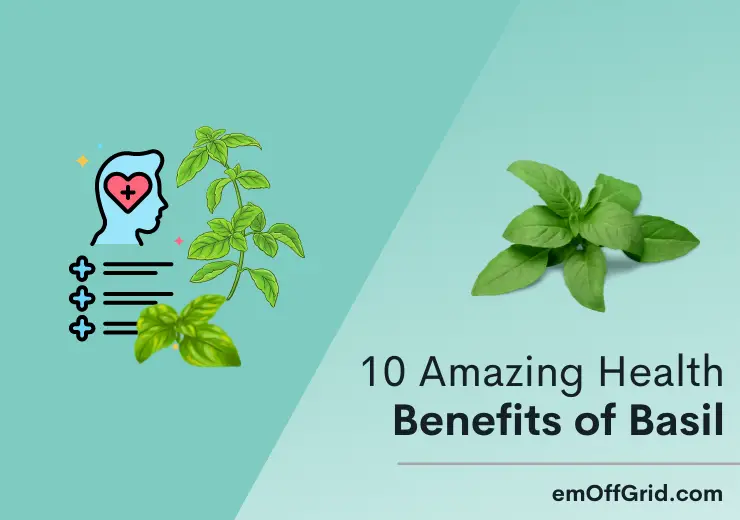Basil is one of the most popular herbs worldwide. But did you know that 10 health benefits of basil exist? You should know them if you live off-grid.
Staying healthy should be your ultimate goal regardless of where you live. Your health becomes a goal if you live off the grid, far from medical facilities. Fortunately, basil can help tackle many chronic conditions and other diseases.
Read on for detailed information about basil and its health benefits. We will also provide some precautions or safety tips when using this herb. Let’s dive right in!
Contents
Basil: Description, Distribution, and Habitat
Basil is a fragrant herb known for its royal status across cultures worldwide. Its scientific name is Ocinum basilicum. These are all of Greek origin. Ocinum means an aromatic herb, and basilicum is king.

Basil is an annual herbaceous plant belonging to the mint family, Lamiaceae. It is characterized by square stems and rounded, slightly pointed leaves that gently curve to form a pointed tip. The leaves are generally light green, but some varieties have purple patches.
This annual herb grows to 50 inches tall, depending on the variety and growing conditions. And we didn’t mention that more than 60 varieties of basil exist. All these differ in scents and flavor. The most common basil varieties include the following:
Sweet Basil
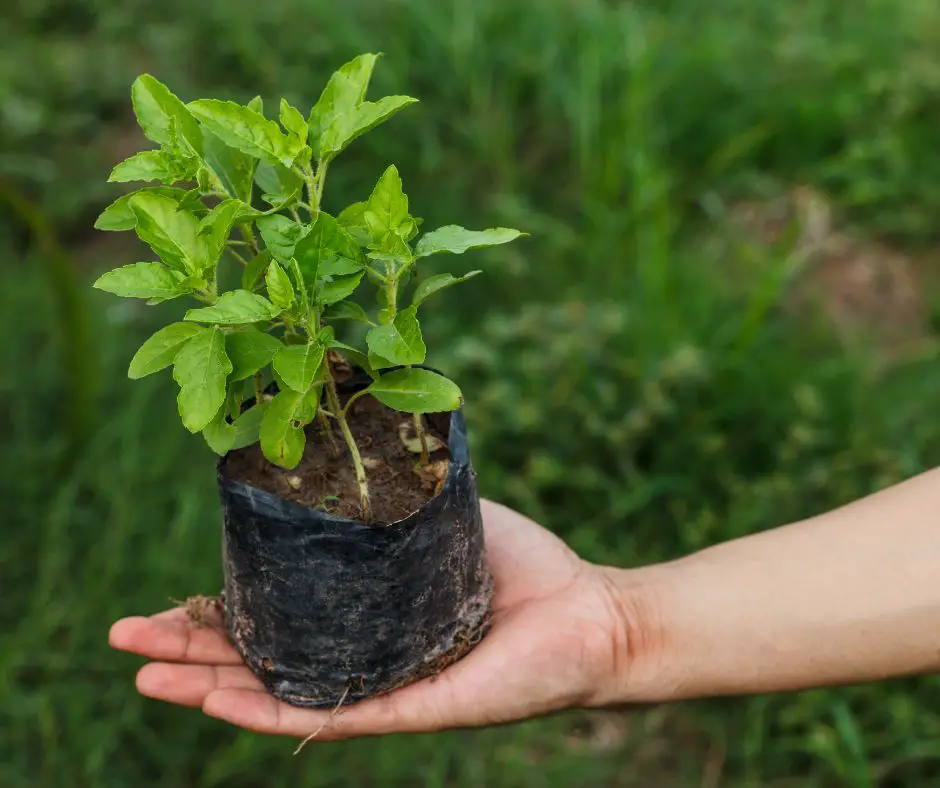
This is the most common type of basil variety. It is known for its rounded leaves and spicy clove flavor that gardeners and cooks like. Sweet basil is the best choice if you want plenty of shoots for pesto and other recipes. It produces large leaves and grows up to 4 inches tall.
Bush/Greek Basil
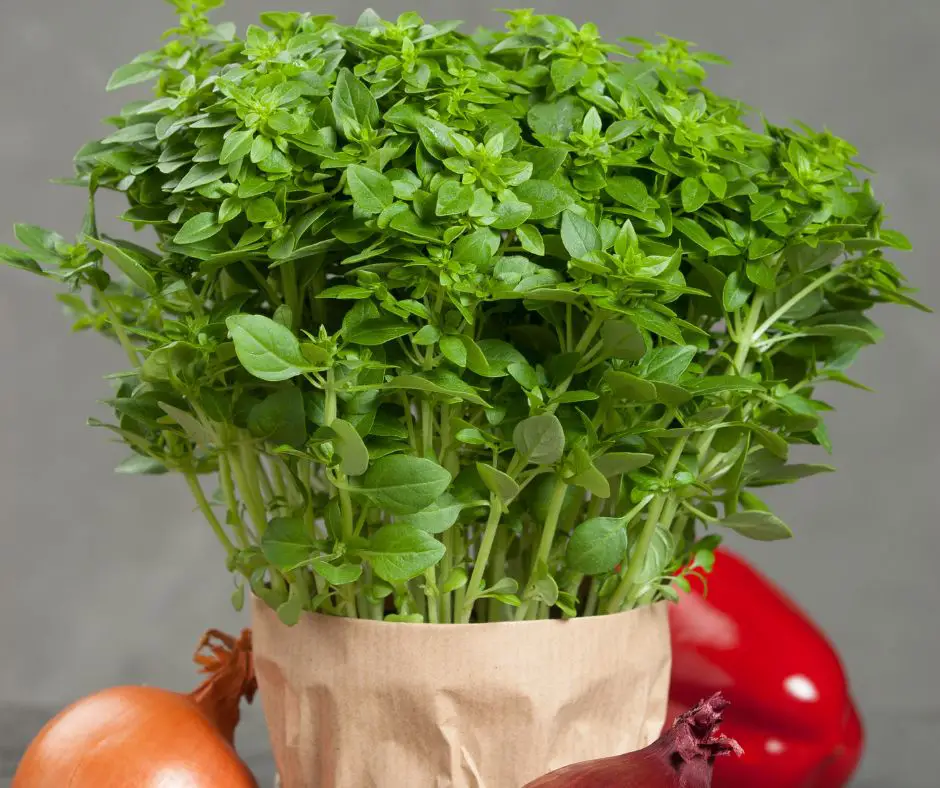
Bush or Greet Basil is also known as the little leaf or fine leaf basil because of its leaf structure that is compact and round. This variety emits a strong basil fragrance and flavor and can be used the same way as sweet basil or any other.
Thai Basil
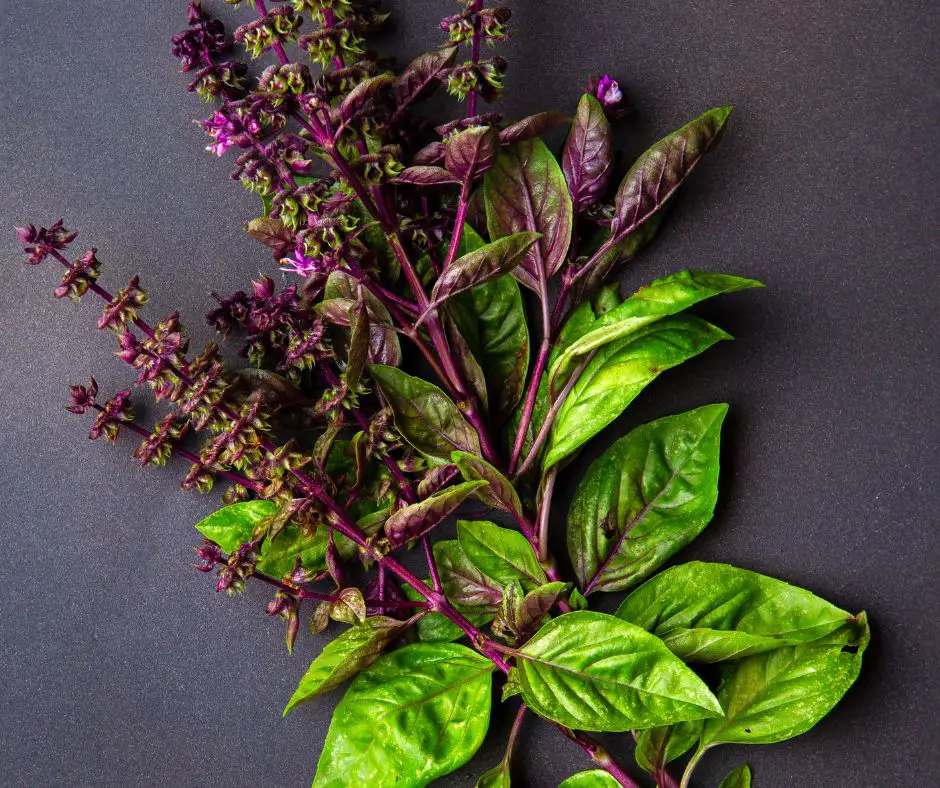
Thai basil is one of the crucial ingredients in most Asian cuisines. You can also use it in salads, curries, noodle dishes, stir-fries, etc. This variety is distinguishable from others by its deep green leaves, red-brown stems, and flowers.
Cinnamon Basil
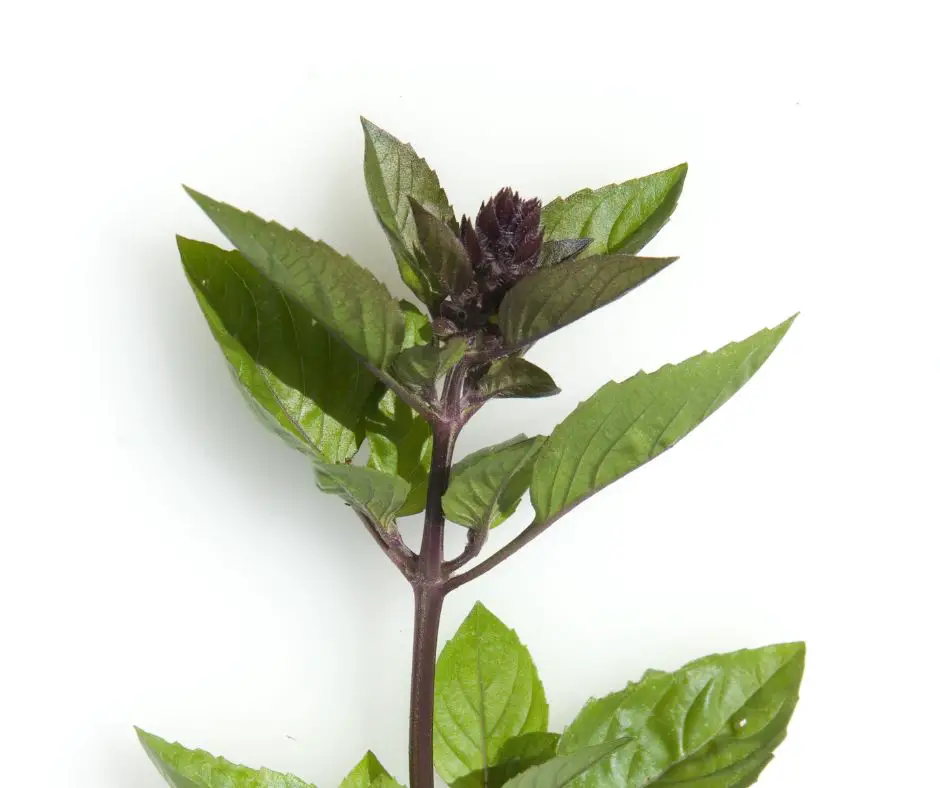
Cinnamon basil is another variety for your delicious dishes because of its mild flavor with hints of Cinnamon aroma. Its beautiful purple and pink flowers can make a statement in your garden!
Lettuce Basil
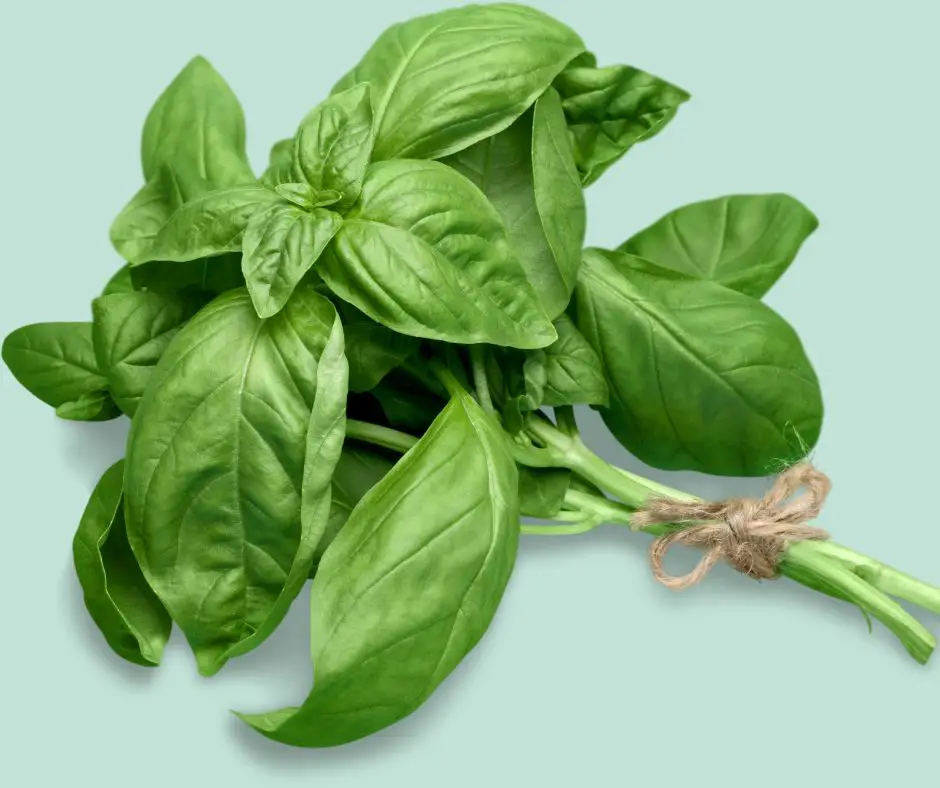
Lettuce basil also works great in salads and other leafy dishes. The leaves are about 4 inches wide and 6-10 inches long. As the name suggests, the leaves are brilliant green and crinkled, resembling lettuce leaves.
At maturity, basil produces small white flowers arranged along the spike that emerges from the stem tip. These flowers drop off after pollination, giving way to seed development in 4 round, dry structures. Basil seeds are small and dark, and edible.
Holy Basil
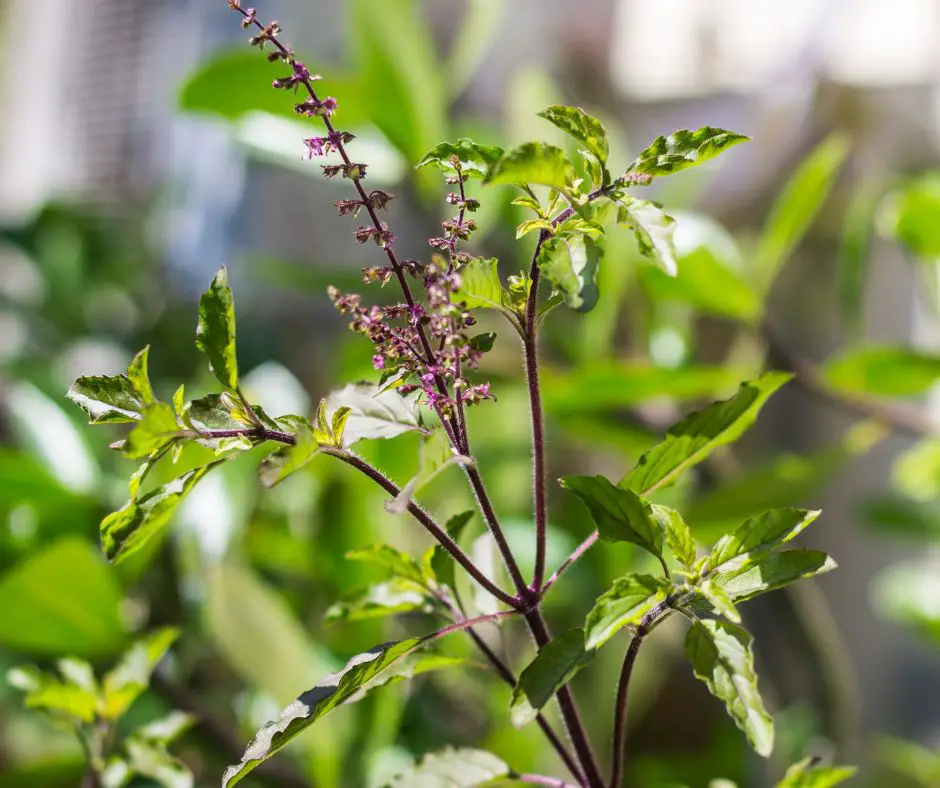
Holy basil, known as Ocimum sanctum or tulsi, is a herbaceous annual plant in the mint family. It is native to India and grows to a height of 3 feet. The leaves are opposite, oval-shaped, and 2-4 cm long.
They have a purplish hue and are covered in tiny hairs. The flowers are white or pink and grow in clusters. It is used in Ayurvedic medicine to treat a variety of conditions, including anxiety, stress, and headaches.
Nutrients
Basil is a highly nutritious herb rich in vitamins and minerals. That is the reason for its use as an ingredient in many cuisines. It also has traces of irons and a wide range of antioxidants.
According to the United States Department of Agriculture, 2.6 grams of basil has the following nutritional constituents:
| Nutrient | Amount in one 2.6-gram tablespoon of basil |
| Calcium (mg) | 4.6 |
| Vitamin A (mcg, RAE) | 6.9 |
| Beta carotene (mcg) | 81.7 |
| Beta cryptoxanthin (mcg) | 1.2 |
| Lutein and zeaxanthin (mcg) | 147.0 |
| Vitamin K (mcg) | 10.8 |
Herb Basil Organic, 4 Ounce
- Herbs Packaged
Distribution and Habitat
Basil is native to Asia (Iran, India, Pakistan, Thailand, etc.) and central Africa. It can be found in the wild in tropical and subtropical regions. However, basil has become a global plant due to human cultivation. You can now find it in Europe and the United States.
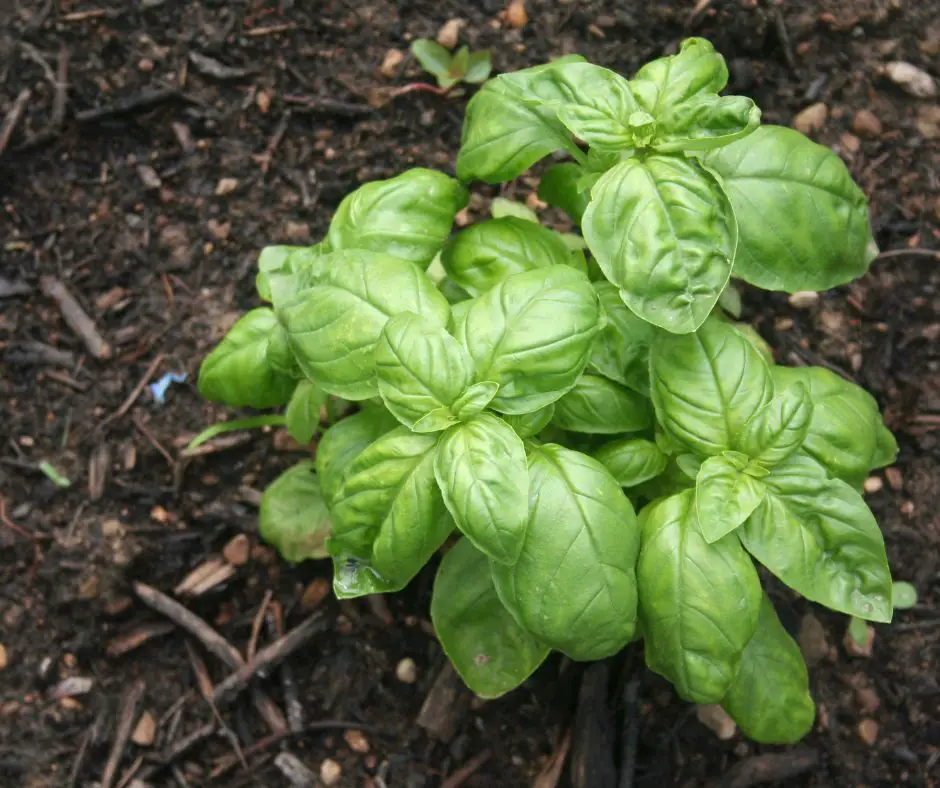
In fact, North America has become the largest producer of basil leaves in the world. It had 51.23% of the world market share, followed by the Asia Pacific with 37.87%.
Basil grows best in regions with at least 6 hours of sunlight daily. The soil should be moderately fertile but well drained. And the good news is that you can grow basils in containers or raised beds in the backyard.
10 Amazing Health Benefits of Basil
Basil is not only a nutritious and fragrant herb but also packs many health benefits. This plant has many compounds that give it antioxidant, anti-inflammatory, and other health properties. You can use it to relieve many ailments and chronic diseases, including the following:
- Basil may help reduce stress and anxiety
- Reduce inflammation and swelling
- Combating infection
- Reduce blood sugar
- Lower your cholesterol
- Support liver health
- Fight cancer
- Protect against skin aging
- Basil boosts mental health: stimulate and vitalize your body
- Protect your stomach
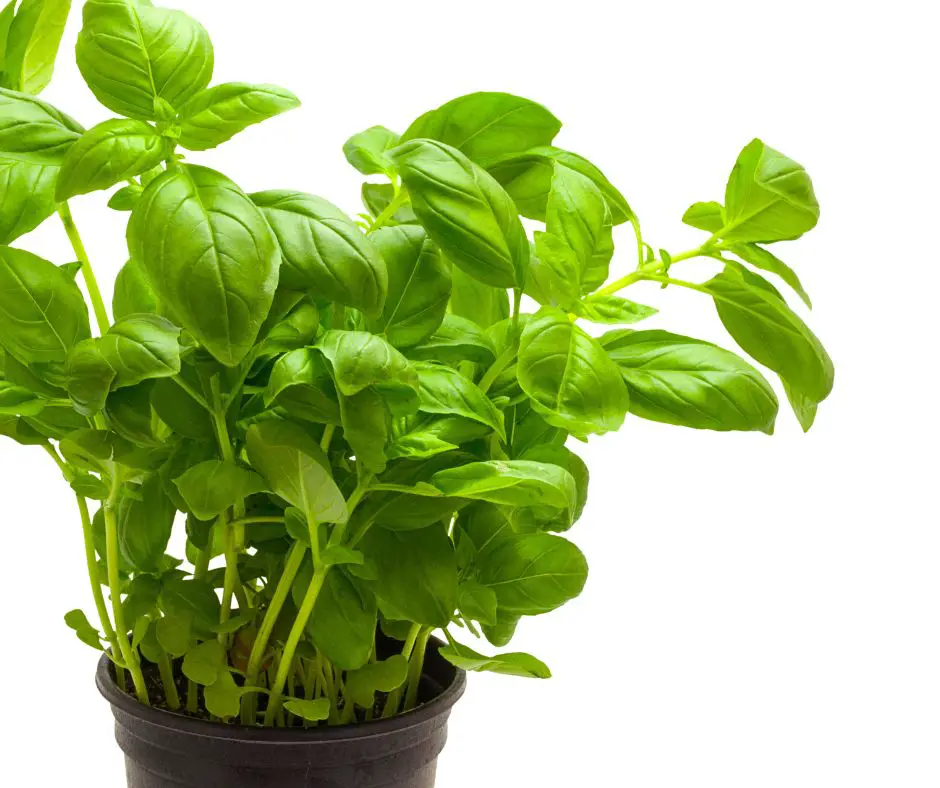
The health benefits of basil are not limited to the ones listed, but the post is about the items listed above.
Basil May Help Reduce Stress and Anxiety
Stress results from chemical, physical, infectious, or emotional causes. According to scientific studies, holy basil has a proven property to help people suppress or cope with physical and other stress types. This herb can also help reduce sexual problems, sleep disorders, exhaustion, and forgetfulness.
Published scientific resources show that basil has antidepressant and anti-anxiety properties. Studies have revealed that an extract from basil leaves can reduce anxiety, stress, and depression, like antidepressant drugs.
You can use basil leaves in your tea to get calming and relaxing effects. Besides, basil does not contain caffeine and other chemicals with side effects. Using it every day for managing stress and anxiety won’t have any negative impact on your health.
Buddha Teas Organic Holy Basil (Tulsi) Tea
- HOLY BASIL TEA - Our Holy Basil ayurvedic tea contains antioxidants that can help promote health and spirituality in everyday life.
- RESTORE & REGULATE - Holy Basil is considered an adaptogen that may help to regulate your body by balancing and restoring various internal systems.
- AYURVEDIC BLEND - Holy Basil Tea spreads across your mouth like a slightly sweet, somewhat spicy surprise. With hints of clove and a light earthiness, we find the taste grounding, yet elevating.
Reduce Inflammation and Swelling
Basil is the complete package you need to relieve stress, anxiety, inflammation, and pain. This herb is rich in chemical compounds that act as anti-inflammatory and antioxidants.
This scientific publication analyzed the inflammatory property of basil essential oil, and the results were encouraging. Undoubtedly, basil oil can help to combat inflammatory diseases caused by oxidative stress.
Patients with arthritis or fibromyalgia can benefit from basil oil. What is yet to be proved scientifically is if you can eat basil leaves or any other part to get the same effects.
Combating Infection
Some basil extracts have antibacterial, antiviral, and antifungal properties. They have been used for centuries by traditional medicine practitioners to prevent infection and boost the wound healing process. Fortunately, there is scientific research to back up these claims.
Researchers applied basil oil to bacteria specimens from hospital equipment and people with skin, respiratory, urinary, and abdominal infections. The results were impressive. Basil effectively eliminated the bacteria.
As a result, researchers strongly believe that basil extracts can be used to prevent infection.
Reduce Blood Sugar
Every part of the holy basil herb can help reduce blood sugar levels and manage type 2 diabetes. A scientific study on humans and other animals has proved the effectiveness of basil in managing the symptoms of type 2 diabetes, such as the following:
- Weight gain
- Hyperinsulinemia, or excess insulin in the blood
- High cholesterol
- Insulin resistance
- Hypertension
Basil leaves can help treat the long-term effects of high blood sugar, but further scientific research is still needed. The use of basil extracts in treating diabetic patients should be proven beyond a reasonable doubt before commercialization.
Lower Your Cholesterol
Holy basil mainly deals with metabolic stress. That is why it can lower cholesterol levels in the body. A scientific study on animals has shown that holy basil can lower cholesterol levels.
The result of the study indicated that they had lower cholesterol in their kidneys, livers, and heart. Both diabetic and non-diabetic rats had the same results after eating holy basil leaf powder.
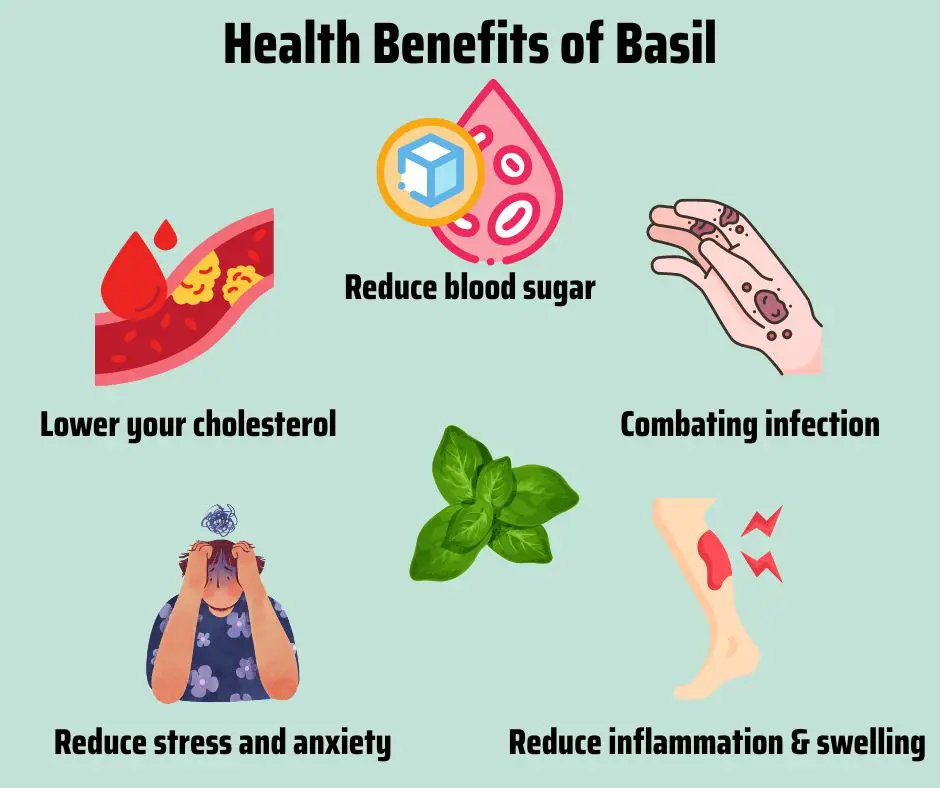
Support Liver Health
A study conducted in 2015 proved that holy basil can support liver health. The researchers used a toxin to intoxicate rats and then gave them a basil powder to test its antioxidant property. They got an impressive result, recording a positive impact on liver health.
However, the same is yet to be tested on human beings. Maybe further studies and research are needed to determine basil’s effectiveness in supporting liver health in people.
Fight Cancer
Basil is rich in antioxidants and mainly helps the body detox. Some studies have shown that this plant can protect the human body against toxic chemicals and slow the growth rate of cancerous cells.
A detailed review focusing on the effectiveness of basil in fighting cancer revealed a breakthrough. The conclusion was that phytochemicals in the basil plant can protect your body from skin, oral, breast, lung, and other types of cancer.
However, the study was only done on animals. Further research is needed to confirm if it has the same effects on human beings.
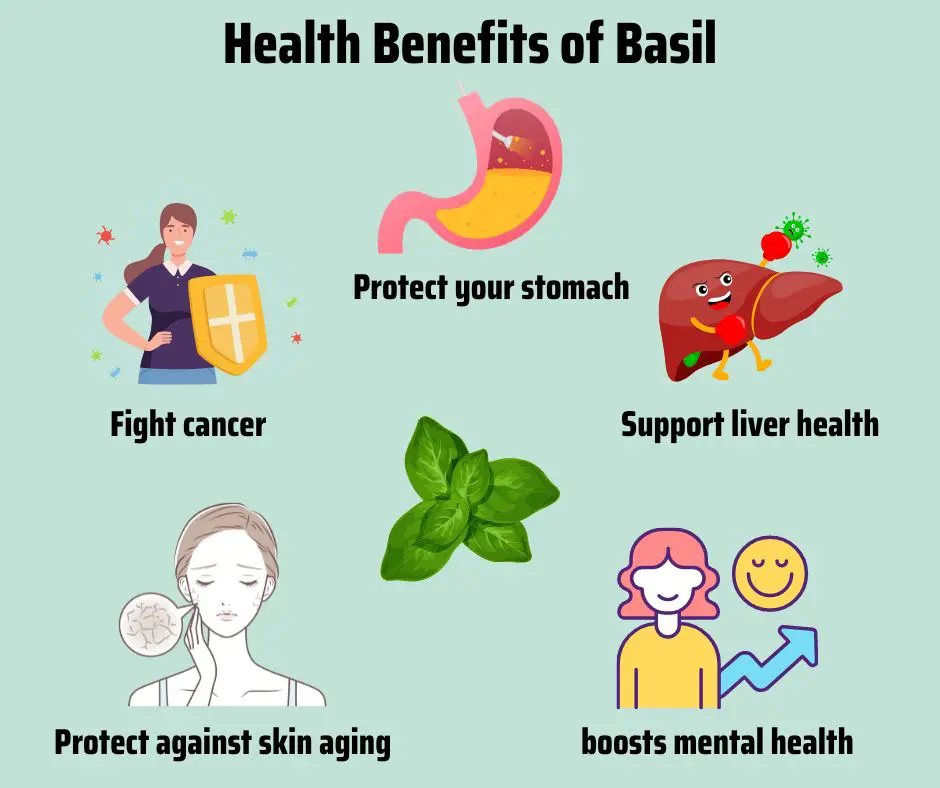
Protect Against Skin Aging
Basil oil is used in many cosmetic products for its fragrance. However, it has the additional benefit of protecting against skin aging.
According to the research, basil extracts applied to the skin can improve hydration and potentially reduce roughness and wrinkling. But you should use basil extract as a cream to get the result. Consuming it will not give you the same effects.
Basil Boost Mental Health: Stimulate And Vitalize Your Body
Basil increases mental alertness when inhaled as aromatherapy. This is not strange since we already know that basil can alleviate stress, anxiety, and depression. You will have a clear mind with an improved ability to think and reason better.
According to a scientific article published in 2014, basil can prevent age-related memory loss.
Protect Your Stomach
Holy basil extracts can combat stress-induced ulcers. It does that by decreasing stomach acid, increasing mucus production by increasing mucus cells, and extending their lifespan.
Holy basil can be the best alternative drug often described for peptic ulcers. They have side effects and may cause discomfort. But with basil, you have a near-perfect remedy for ulcers.
Risks and Side Effects of Basil
Basil is a beneficial herb with many health benefits. However, it does not come without associated risks. It is not a perfect remedy to the health conditions described in all people. It can have side effects, including, but not limited to, the following:
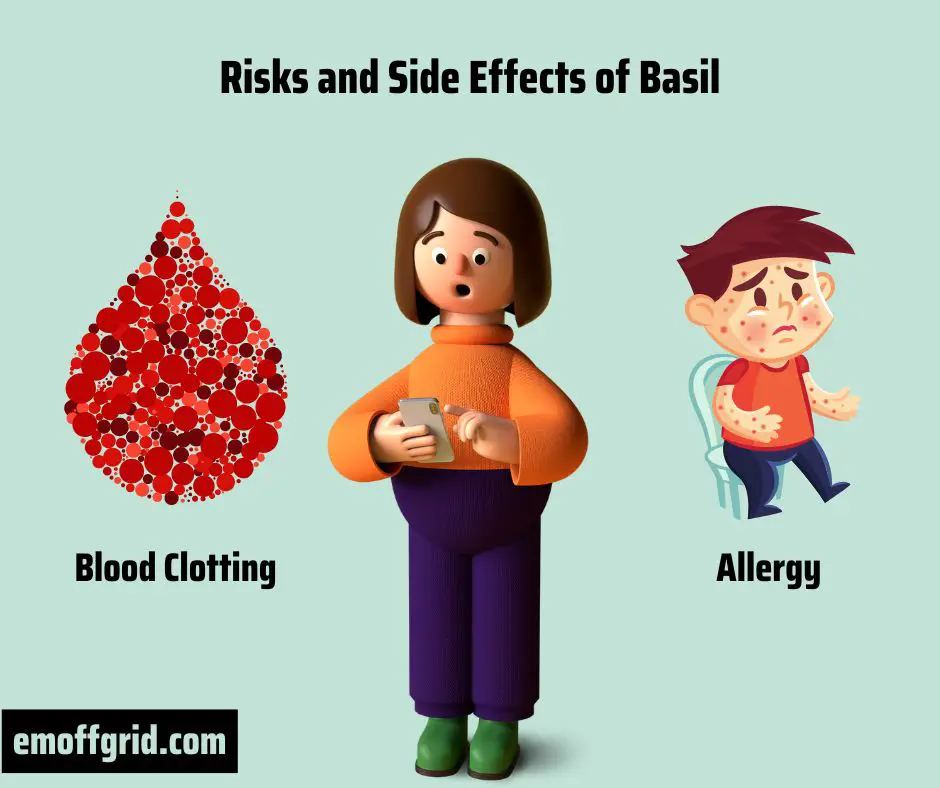
Blood Clotting
Basil is rich in vitamin K, a vitamin with a vital role in the blood clotting process. As a result, basil can interfere with other medications. For example, anyone using blood thinners should only use basil under the doctor’s instructions.
Allergy
Some people are naturally allergic to plants in the mint family. Anyone with this allergy type is unfit to use basil in whichever form because of the risks involved.
Allergic reactions caused by basil come with hives, swelling, and breathing difficulties. Victims may experience anaphylaxis in severe cases. All these conditions require medical attention and should never be ignored.
Special Precautions & Warnings When Using Basil
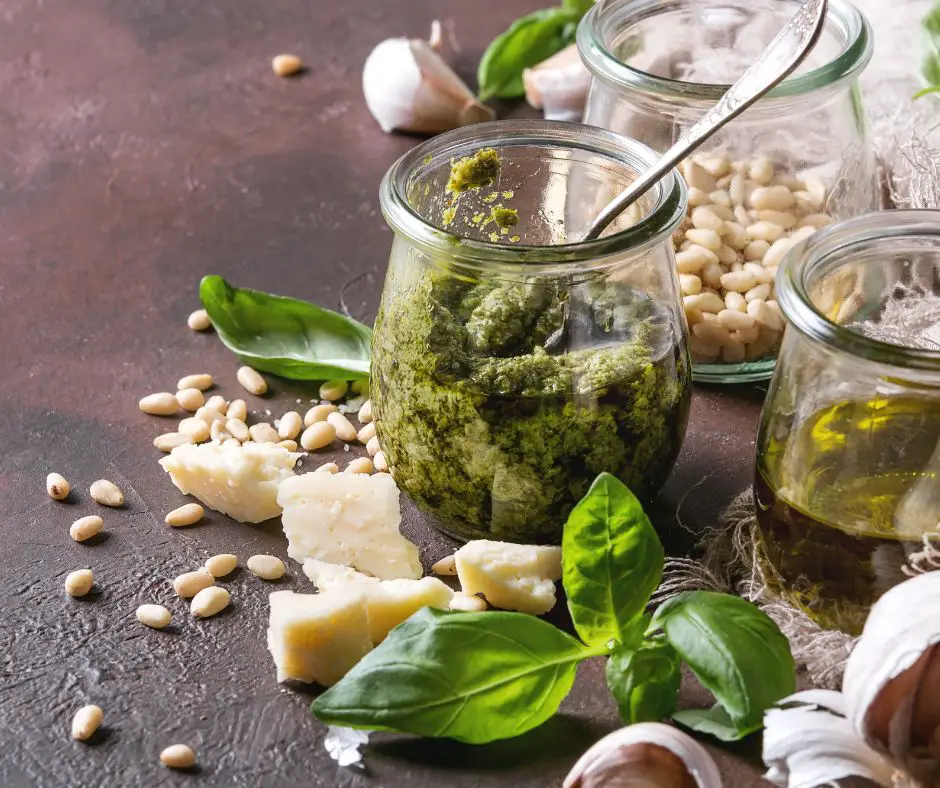
Basil is not all that safe and not controlled by the FDA. Therefore, you should be cautious when using this herb. Consider the following precautions:
- Consult your doctor before using basil in any form
- Basil is yet to be approved for use by infants, minors, or pregnant/breastfeeding women.
- Buy organically grown basils from a reputable source in an unpolluted area.
- Avoid using basil if pregnant, lactating, or want to conceive.
Tips for Use Basil as Medicine
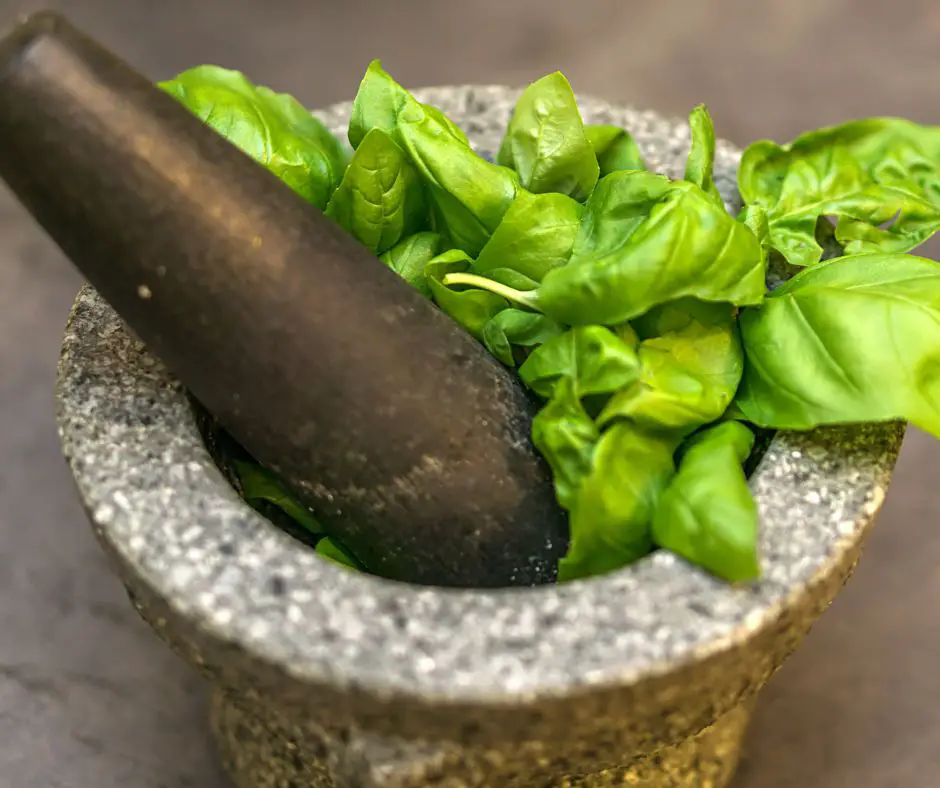
- The recommended daily dosage for holy basil extract supplements is 300 mg to 2,000 mg when used as a preventive measure.
- The recommended dose for treatment is 600 mg to 1,800 mg, taken many times a day.
- Stem, leaves, flowers, and roots can be used in supplements and topical ointments.
- You can make basil tea from its leaves, flowers, or dried powder.
Last Sentences
Basil is a highly fragrant, nutritious, and beneficial herb you can find in almost every country. You can use it to spice up food, but its health benefits are the focus. It helps reduce stress and anxiety, inflammation and swelling, blood sugar and cholesterol, fight cancer, promote skin health, and many more!
Thank you for your time reading this article at Em Offgrid. We hope you are now informed about the health benefits of basil herb. If that is the case, kindly help us share this post with your friends to pass the information to them.
